 Petzlover
Petzlover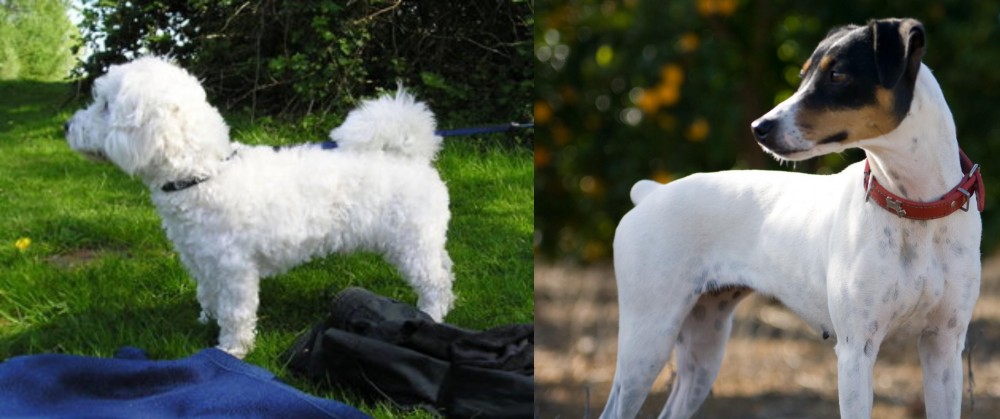 Franzuskaya Bolonka is originated from France but Ratonero Bodeguero Andaluz is originated from Spain. Franzuskaya Bolonka may grow 16 cm / 6 inches shorter than Ratonero Bodeguero Andaluz. Both Franzuskaya Bolonka and Ratonero Bodeguero Andaluz are having almost same weight. Both Franzuskaya Bolonka and Ratonero Bodeguero Andaluz has almost same life span. Franzuskaya Bolonka may have less litter size than Ratonero Bodeguero Andaluz. Both Franzuskaya Bolonka and Ratonero Bodeguero Andaluz requires Low Maintenance.
Franzuskaya Bolonka is originated from France but Ratonero Bodeguero Andaluz is originated from Spain. Franzuskaya Bolonka may grow 16 cm / 6 inches shorter than Ratonero Bodeguero Andaluz. Both Franzuskaya Bolonka and Ratonero Bodeguero Andaluz are having almost same weight. Both Franzuskaya Bolonka and Ratonero Bodeguero Andaluz has almost same life span. Franzuskaya Bolonka may have less litter size than Ratonero Bodeguero Andaluz. Both Franzuskaya Bolonka and Ratonero Bodeguero Andaluz requires Low Maintenance.
 The Franzuskaya Bolonka in France is known as the Tsvetnaya Bolonka in Russia and in Germany as the Bolonka Zwetna. All of these translate to Colored Bolognese. It is known as the “Pride of Russia” and was rediscovered by the Russians following the thaw of the Cold War. It is also sometimes translated as a colored lapdog.
The Franzuskaya Bolonka in France is known as the Tsvetnaya Bolonka in Russia and in Germany as the Bolonka Zwetna. All of these translate to Colored Bolognese. It is known as the “Pride of Russia” and was rediscovered by the Russians following the thaw of the Cold War. It is also sometimes translated as a colored lapdog.
The Bolonka is a rare breed in the toy category with ancestors in the Bichon Friese line. This little dog looks very much like the national dog of Cuba – the Havanese. In addition to the Bichon other small dogs in this ancestral line include the Shih Tzu, Toy Poodle, and Pekingese as well as the French, Italian and German Bolonka. They are often confused with the Bolognese as both breeds appear in various countries and have many similarities.
In all countries the common name for this dog is the Bolonka. They have a variety of names and nick names depending on the country. In addition to being the “Pride of Russia” he is called a Russian colored Bichon, Czechs call it the Bareyny Bolonsky, the Germans since 1980 have called it the Bolonka Zwetna but the Nordic Kennel Union does not recognize the Zwenta only the Russian Twetnaya.
The French version is seen to be the original with its ancestry dating back to the 18th century when Russian nobles were presented with a Bolonka by Louis XIV of France, and others migrated with the army of Napoleon to Russia. They were still known as the Bolonka of France. Small dogs were not popular in Russia due to the need for dogs that could work on farms and/or hunt. Particularly during the Soviet years, they were considered unnecessary. No Bolonkas were imported to Russia during the Soviet regime, so only localized breeding took place. The goal of breeders in the Soviet Union was to develop a toy dog, lap sized with an apartment living temperament.
During the cold war the Russians sent a pair of breeding Franzuskaya Bolonka to East Germany and they began to develop the breed there as well. At the same time the colored versions of the Bolonka were being bred. The Franzuskaya Bolonka is recognized by the Verband Dur Das Deutsche Hundewesen (VDF) while the other colored breeds are not. The white Bolonka is not recognized by the Federation Cynoloqique Internationale as a breed separate from the Bolognese but as simply another version. Individual clubs throughout the world recognized one or more versions of the Bolonka. They are thought to be the rarest within the Bichon family.
Today’s Bolonka is owed by Prince William and Princess Kate, giving the breed more publicity than it has had in many years.
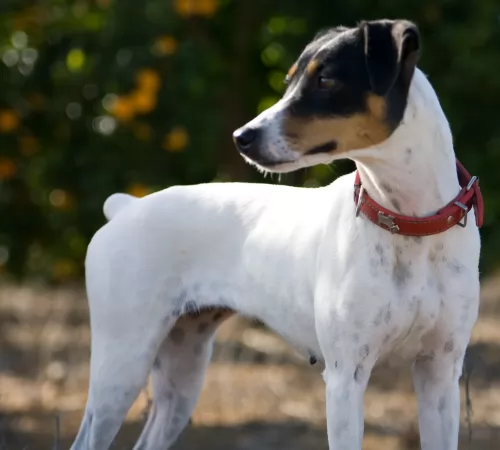 Long ago the English visited Spain to sample their wines, bringing with them smooth coated English Fox Terriers which were later crossed with other dog breeds of the area.
Long ago the English visited Spain to sample their wines, bringing with them smooth coated English Fox Terriers which were later crossed with other dog breeds of the area.
It is believed that the Andalusia Ratter’s ancestors were smooth coated fox terriers. The Club Nacional del Perro Andaluz Ratonero Bodeguero was established and in 1993 a standard for the breed was set.
It is only fairly recently that the breed was recognized by the Royal Canine Society of Spain but it isn’t recognized by any of the major kennel clubs.
 The Franzuskaya Bolonka is neither heavy boned nor fine boned. They are a toy breed with a moderate bone structure. The ears are neither long nor short and they have tails that touch the back at the tip. Like others in the Bichon family the Franzuskaya Bolonka does not shed. He is a sturdy little dog and the male has a distinct beard and moustache that the females of the breed do not. They have long coats that are wavy and curly. The Franzuskaya Bolonka is of course only white. The Russian version might be brown, red, black, wolf-gray, gray and of course white.
The Franzuskaya Bolonka is neither heavy boned nor fine boned. They are a toy breed with a moderate bone structure. The ears are neither long nor short and they have tails that touch the back at the tip. Like others in the Bichon family the Franzuskaya Bolonka does not shed. He is a sturdy little dog and the male has a distinct beard and moustache that the females of the breed do not. They have long coats that are wavy and curly. The Franzuskaya Bolonka is of course only white. The Russian version might be brown, red, black, wolf-gray, gray and of course white.
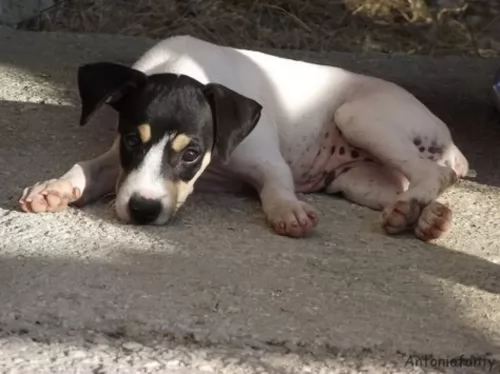 Also known as the Spanish Jack Russell, the Ratonero Bodeguero Andaluz looks very similar to this popular Jack Russell Terrier.
Also known as the Spanish Jack Russell, the Ratonero Bodeguero Andaluz looks very similar to this popular Jack Russell Terrier.
He is a small to medium sized dog with a lean, muscular body. The Ratonero developed in the south of Spain and is thought to be a mix of local ratting dogs and Fox Terriers. This ensured a quick, agile hunter.
The dog stands at between 35 – 43cm in height and weighs 6 - 9kg. The dog’s head is fairly small with dark brown eyes and half erect-half floppy ears. The coat is mainly white with some freckling. It is short and smooth with shades of black and tan covering the facial area. Some of these dogs are born with a natural bob-tail.
These dogs are known to have robust, hearty, happy personalities, full of the joys of living. They get on well with children as well as other pets if they have grown up with them.
Introductions should be slow if one of these dogs are brought into a home where there are already other pets. He is a very active breed and will be requiring plenty of mental stimulation and physical exercise.
They can provide quite a bit of entertainment for their human families as they can become quite clownish. They’re the kind of dogs that can adapt to life in the countryside or the city.
 The Bolonka is great with kids, just avoid too intense play.
The Bolonka is great with kids, just avoid too intense play.
The Bolonka is a playful, lap dog with a lot of love to offer
Good adaptability great in the city in apartments and great in the country as well
They are very smart and love to learn. Being firm but beyond firm is also kind.
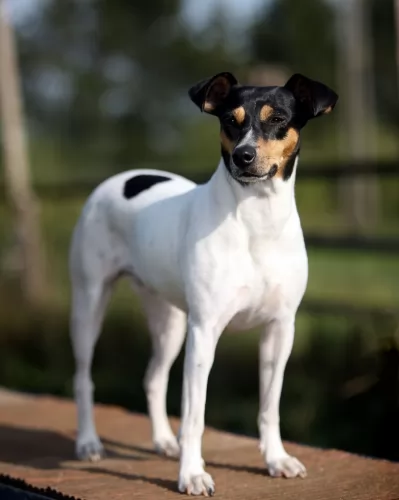 Your Ratonero Bodeguero Andaluz to this day is a ratter, always alert and ready to spring on prey. He is always lively and friendly, and with his loving nature, makes a splendid companion for his human family.
Your Ratonero Bodeguero Andaluz to this day is a ratter, always alert and ready to spring on prey. He is always lively and friendly, and with his loving nature, makes a splendid companion for his human family.
He is also a stubborn dog, liking to go his own way, and therefore will require training and socialization. He is an adaptable little dog too and when you bring him into your home he is willing to adapt to your way of life and become a loyal and loving member of your family.
 Medical issues are not fully documented because of the rarity of the breed and the years of isolation in the Soviet Union.
Medical issues are not fully documented because of the rarity of the breed and the years of isolation in the Soviet Union.
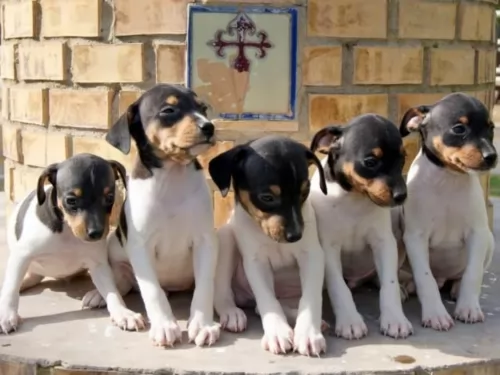 With good care, your Andalusian Ratter isn’t likely to get sick, but still, you would be better off knowing about some of the common dog diseases your pet could get.
With good care, your Andalusian Ratter isn’t likely to get sick, but still, you would be better off knowing about some of the common dog diseases your pet could get.
This is usually seen in young dogs where there is lameness in the hind legs and hip pain. It is believed that Legge Perthe’s occurs because of a genetic predisposition, and when it develops, there is sadly no cure.
Skin infections may seem fairly mild but nothing can be further from the truth. They can be painful and frustrating. Skin redness, dryness, itchiness and pain can cause your pet to lick and bite and make the situation worse. If your pet is being driven crazy by a skin irritation, get him to the vet who will do a complete physical examination.
Other diseases to be aware of include hip dysplasia, obesity, epilepsy and bloat.
 Feed at least 3 meals a day. Feed one fourth of a cup daily split into three meals of a high quality puppy food.
Feed at least 3 meals a day. Feed one fourth of a cup daily split into three meals of a high quality puppy food.
Feed at least 2 meals per day. Feed one half of a cup daily split into two meals of a high quality dry food.
Fairly healthy breed due to isolation during cold war
The Franzuskaya Bolonka is developed as a lap dog but that does not mean he doesn’t need daily exercise. He loves to play but play gently and not for any length of time. They like to chase balls, play hide and seek and any tricks you want to teach them.
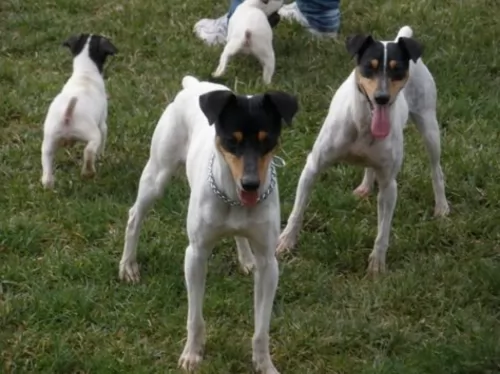 This is a fairly low maintenance dog as the short smooth coat will be easy to brush twice a week.
This is a fairly low maintenance dog as the short smooth coat will be easy to brush twice a week.
Check him over for unusual lumps, trim his nails and check inside his ears, look into his eyes to ensure they are bright and alert and look inside his mouth to make sure he doesn’t have any rotten teeth.
Have your pet neutered or spayed if you want to avoid puppies. This can be beneficial for your pet’s health too.
Feed your Ratonero Bodeguero Andaluz only the best food there is. If you opt for commercially manufactured food, make sure its full of vitamins and minerals. Your little pet will want consistency and simplicity with his food to avoid digestive problems.
Try and provide him with some home-made food which can be added to the dry kibble twice a week as a treat. Boiled chicken, brown rice or pasta and spinach, sweet potatoes and carrots all chopped up ad mixed into the dry kibble will ensure your pet’s health.
Some raw meat added in occasionally will also go towards ensuring his good health.
Always make sure he has access to fresh, cool water.
Provide him with a safe, dry, warm, comfortable place to sleep.
Get him to the vet when you see he is sick.
Ensure he has sun and shade in the garden.
Never ever leave him in a hot car.